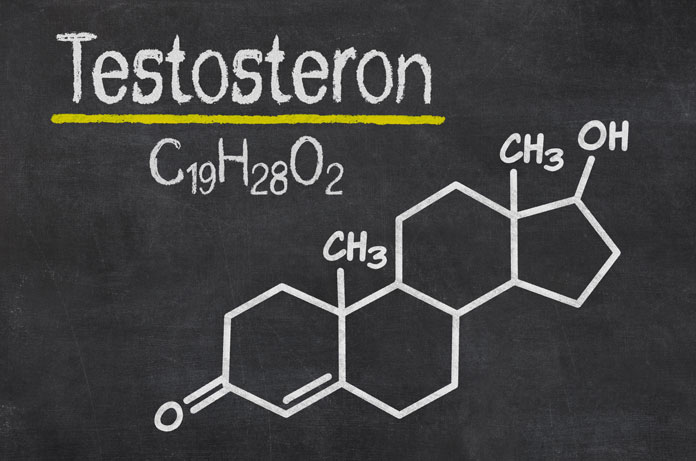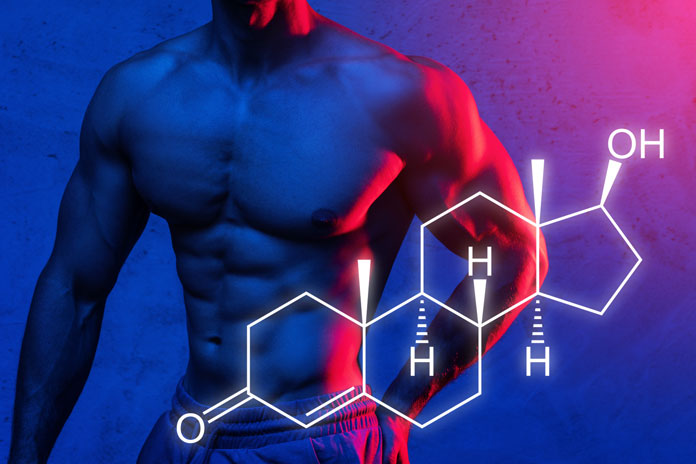Even though both sexes have different levels of testosterone, this hormone is mainly considered a male hormone. In fact, sooner or later the...

While young men usually do not have a significant lack of testosterone, aging men notice all the symptoms of a reduced testosterone level from their mid-forties at the latest. In addition, lifestyle has a decisive influence on when and to what extent the hormone level drops continuously. Anyone who lives a healthy lifestyle sleeps enough, avoids stress, and eats enough nutrients usually has a balanced testosterone level.
We can also put it another way: If you pay attention to a healthy lifestyle, you can keep the testosterone level high. You can even improve it naturally. We show here in the concentrated form how many ways and means there are to positively influence testosterone levels. But it is also a fact that your testosterone level is subject to certain fluctuations due to age and day-to-day. This is true even if you optimize everything you can.
A lively sex life
In fact, active sex life can do something for your testosterone levels. This circumstance results from the fact that testosterone levels reach a low point when it has been a week since the last sex. So if you haven't had sex for a long time, you have a permanently low testosterone level - especially if your lifestyle is not particularly healthy.
But you can do something about it. You can find out which adjustment screws you can work on in the following sections. But the first thing you need to do when it comes to testosterone is to stop sexual abstinence and ejaculate regularly. This naturally balances testosterone.
Avoiding stress pays off
The fact is: stress is a testosterone killer. One contributor is the increased release of cortisol, a stress hormone. The cortisol boost ensures that you feel more energy in the short term during a stressful time. Unfortunately, cortisol can also be seen as an opponent of testosterone. The immune system also weakens under the influence of cortisol. Constant stress is particularly harmful, for example due to high pressure to perform.
So if you reduce the stress in your life, you can achieve higher testosterone levels in a short time. Regular garlic consumption also has the reputation of being able to stand up to the stress hormone. This is due to the allicin contained in garlic. However, it is also known for its special scent brand. You can also achieve testosterone-boosting stress reduction by improving sleep quality. Because your body produces hormones while you sleep.
Frequent lack of sleep causes testosterone levels to plummet, even in young men. In this way, even a newborn in the family that deprives a young father of sleep at night is detrimental to testosterone production. Those who wake up rested after a good night's sleep, on the other hand, have good testosterone levels.
Do moderate exercise
Exaggerations do not make sense in any area. Even with sporting activities, moderate strength or endurance training benefits the testosterone value more than exhausting yourself every day and going beyond your limits.
Experts believe that a 45-minute cardio workout makes sense for good reasons. Stories circulate among specialists that some marathon runners have developed a broken hormone balance through permanent overtraining. The stress that came with the constant training didn't fail to have an effect. So the advice to ambitious competitive athletes is to have their testosterone levels checked at least twice a year.
It is comforting that intensive training to build muscle can be very beneficial for testosterone status. Research has shown that intense interval training can lead to a 40 percent increase in testosterone levels. It is important that the muscles are trained in large groups. You should only do a few training sessions with short breaks. This effectively increases testosterone release. Moderate and targeted muscle-building training can therefore be quite helpful.
However, you will significantly lower your testosterone levels if you overdo it with exercise. It has been proven that intensive marathon training or ultramarathon training, for example, causes a drop in testosterone levels.
Testosterone increase through food and food control
You can influence your testosterone levels in your favor by diet and avoiding weight gain. You should also supply certain vital substances in heaps - if necessary via dietary supplements. Here we show how this can be done.
Lose excess belly fat
Most people now know that visceral fat, or belly fat, is unhealthy. It develops a life of its own in the form of a hormone-like influence. With increasing age, however, athletic men also put on more abdominal fat.
A waist circumference of more than 95 centimeters automatically means higher risks for high blood pressure, type 2 diabetes, dyslipidemia, and obesity. Above all, excess abdominal fat increases the risk of testosterone deficiency. The reason: An enzyme called aromatase is also produced in abdominal fat. This converts testosterone into estrogen "estradiol".
This increases the imbalance between female and male hormones - with all the known consequences. So it makes sense to lose belly fat. This measure is particularly effective if you have already eaten more than 104 centimeters of waist circumference. Weight loss is rewarded with improved testosterone levels.
fasting and intermittent fasting
Fasting regularly or engaging in various forms of intermittent fasting has a positive effect on testosterone levels. A study has shown that testosterone levels can be increased by intermittent fasting. Men of normal body weight should last for between 12 and a maximum of 56 hours. According to the study, this improves testosterone conversion by up to 180 percent.
But it can also have a positive effect if you stop eating carbohydrate-rich food after 6 p.m. Then you will have higher testosterone levels the following morning. The stimulation for hormone production is carried out to a large extent at night.
Have oatmeal and oat bran for breakfast
If you can't imagine fasting, oatmeal and oat bran are recommended. Consumed in the form of porridge, oats can raise testosterone levels. Avenacosides are found in oats. These block the production of a special protein, which in turn can block testosterone. So if you eat oats, you have more testosterone because the protein is prevented from interfering with the testosterone's job.
Eat cabbage more often
Most types of cabbage are not popular with men. The reason is usually not even of taste. It lies more in the body's own "scent brands", which are attributed to eating cabbage. However, cabbage should be on the menu for those with low testosterone status.
Broccoli, kale, cauliflower, Brussels sprouts, red cabbage, or white cabbage are not only good sources of vitamin C. They also contain phytochemicals and inhibit the enzyme aromatase. As mentioned above, this reduces testosterone.
Natural testosterone increase through medicinal plants
Various medicinal plants can be used to increase testosterone levels. The Chinese in particular like to use such means.
pine pollen
Traditional Chinese Medicine (TCM) has long been of the opinion that pine pollen - i.e. the pollen of pine trees - has a positive effect on testosterone levels and libido in addition to anti-inflammatory and immune-boosting properties.
The Chinese see the reason in the hormone androgen it contains. This balances male and female hormones and increases testosterone production. Bodybuilders also know pine pollen as "pine pollen". However, anyone who reacts to pine pollen in the air they breathe with hay fever symptoms should avoid taking it.
Real ginseng
Traditional Chinese medicine also appreciates ginseng as a medicinal plant. At the same time, the Chinese see it as a natural sexual enhancer that can be used to keep testosterone levels high. At the same time, they use ginseng as an anti-exhaustion, immune-enhancing, memory-enhancing, and health-enhancing stimulant or tonic.
A few pieces of ginseng root are cut into thin slices and poured over with boiling water. After steeping, the liquid is drunk as ginseng tea. It is important that the ginseng root is of good quality. You can get real ginseng in Asian stores or health food stores. Ready-made ginseng tea from tea bags is not as effective as fresh ginseng.
nettle root
Nettles have positive properties overall – but when it comes to testosterone, nettle root is of particular interest. Studies show that nettle roots can prevent prostate diseases. This has been proven in scientific studies. They also inhibit the enzyme aromatase, which we have dealt with here several times. It follows that testosterone production increases after taking nettle root extract.
Increase testosterone with supplements
The targeted use of dietary supplements can also have a positive effect on testosterone levels. Vital substances have a much more important effect on hormone status than most men know. Many vital substances support the organism in producing testosterone. A diet rich in vital substances, therefore, contributes to good testosterone levels.
zinc
The trace element zinc is at the forefront when it comes to its indispensability in metabolic processes. The "German Society for Nutrition" (DGE) assumes that healthy adult men should take 10 milligrams of zinc per day. One has to assume that our modern diet no longer supplies this amount of zinc.
Good sources of zinc are animal foods such as yogurt, cheese, meat, fish, and seafood, as well as beans and nuts. Zinc substitution may make sense for vegans. Zinc is taken in liquid or tablet form also boosts testosterone production.
Unsaturated fatty acids
Modern nutrition is mostly industrially produced and full of unhealthy fats. These indicate an unhealthy diet. Testosterone requires cholesterol to produce. Biochemically, testosterone molecules are based on a fatty formula. A diet high in healthy fats can therefore favor testosterone production. For this, you should increasingly use fatty acid sources such as nuts, avocados, seeds, salmon, or virgin olive oil.
Saturated fats are not as good for your testosterone levels as unsaturated fats. On the contrary. Avoiding red meat, fatty dairy products like butter, shortenings or fatty cheeses, chicken products, and fatty pork will have a positive effect on your testosterone levels.
Vitamin D
Researchers and medical professionals assume that most people in northern countries have a latent vitamin D deficiency. Sun creams with a higher sun protection factor and functional clothing are also responsible for this. The long and dark winter months also take their toll. Even a latent vitamin D deficiency leads to exhaustion, listlessness, and the famous winter blues. Depressive moods also affect testosterone levels.
A sufficiently high vitamin D level inhibits the already mentioned aromatase. This enzyme converts testosterone into estradiol. Better to stop the aromatase from doing it. The need for vitamin D3 is individual. It should therefore be determined by a family doctor with a test. The basic stock of vitamin D can be obtained naturally from foods such as herring or salmon, eggs, and avocado as well as sunlight.
creatine
Most men are familiar with creatine as a performance-enhancing supplement. However, studies also show that the intake of creatine has a positive effect on testosterone levels. Creatine intake can therefore not only ensure a better testosterone value for bodybuilders. However, creatine does not directly increase testosterone. Rather, it increases levels of dihydrotestosterone (DHT), a metabolite of testosterone. According to a study, the long-term possible increase is around 22 percent testosterone growth.
Phyto androgens
Some herbal remedies score with so-called Phyto androgens. These are herbal substances that are similar to testosterone. So you could try to stimulate testosterone production by increasing your intake of phytoestrogen-containing foods. So far, however, this has not been scientifically confirmed.
The already mentioned pine pollen, ginseng, and nettle root convinces with many Phyto androgens. But there are also phytoestrogens in maca, pine nut, and olive leaf extracts as well as in terrestrial thorn. There are supplements on the market that contain all of the ingredients just mentioned.
It is advisable to only use products that actually only consist of plant-based ingredients. Products that also contain other substances do not help any better.
Last but not least: avoid “testosterone killers”.
From everything that has been said so far, the most important "testosterone killers" can be concluded. All in all, an unhealthy lifestyle is just as detrimental to testosterone production as an unhealthy diet. For example, many men are not aware that frequent alcohol and nicotine consumption has a negative impact on testosterone production.
In particular, high beer consumption is devastating for testosterone status. The hops contained in beer are a phytoestrogen. So it does not belong to the phytoestrogens but supplies your organism with plant estrogen. Unfortunately, other alcoholic beverages also have an impact on testosterone production when consumed in appropriate amounts.
To what extent and whether smoking can lower testosterone levels has not yet been clarified. The situation is different with factors such as stress and lack of sleep. Permanent stress or acute stress has been shown to have an effect on hormonal balance. The stress hormone cortisol affects testosterone production. Young men in particular are susceptible to stress effects like these. Frequent lack of sleep has a similarly fatal effect. Anyone who suffers from sleep deficits over a long period of time due to party nights or shift work risks significant testosterone losses.
Studies have shown that even four hours of sleep deprivation can result in a 40 to 60 percent drop in testosterone. The reason for this lies in the missing REM phase. While you are in deep sleep mode, the brain receives important impulses for hormone production. Without the REM phase, little or no messenger substances are produced that bring about hormone production. Every man should allow himself eight hours of sleep. A short “power nap” can also reduce stress. The testosterone nap should not last longer than half an hour.















COMMENTS